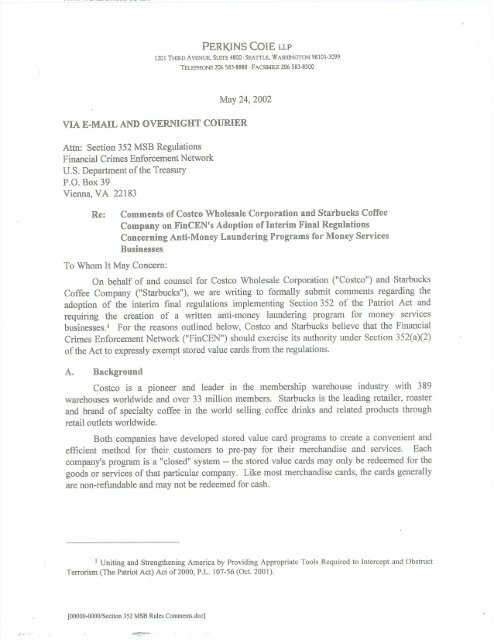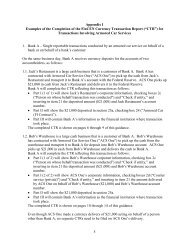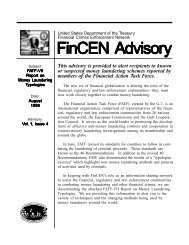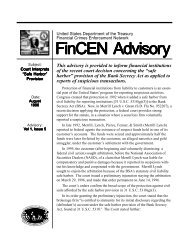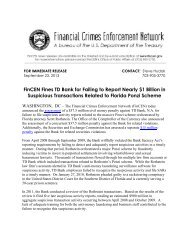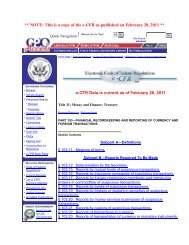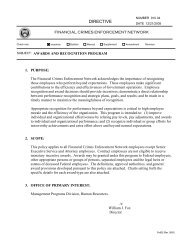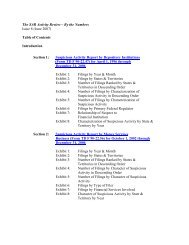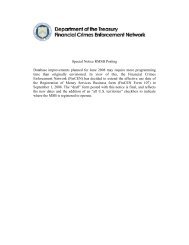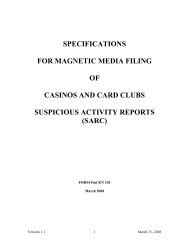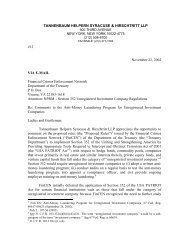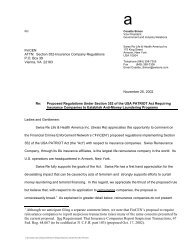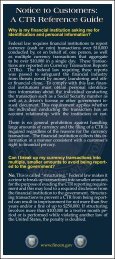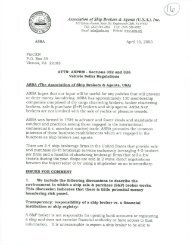PERKINS COlE LLP A. - FinCEN
PERKINS COlE LLP A. - FinCEN
PERKINS COlE LLP A. - FinCEN
Create successful ePaper yourself
Turn your PDF publications into a flip-book with our unique Google optimized e-Paper software.
<strong>PERKINS</strong> <strong>COlE</strong> <strong>LLP</strong><br />
1201 THIRD A VENUE, SUITE 4800. SEATILE, WASHINGTON 98101-3099<br />
TELEPHONE 206 583-8888 . FACSIMILE 206 583-8500<br />
May 24, 2002<br />
VIA E-MAIL AND OVERNIGHT COURIER<br />
Attn: Section 352 MSB Regulations<br />
Financial Crimes EnforcementNetwork<br />
U.S. Departmentof the Treasury<br />
P.O. Box 39<br />
Vienna, VA 22183<br />
Re: Comments of Costco Wholesale Corporation and Starbucks Coffee<br />
Company on <strong>FinCEN</strong>'s Adoption of Interim Final Regulations<br />
Concerning Anti-Money Laundering Programs for Money Services<br />
Businesses<br />
To Whom It May Concern:<br />
On behalf of and counsel for Costco Wholesale Corporation ("Costco") and Starbucks<br />
Coffee Company ("Starbucks"), we are writing to formally submit comments regarding the<br />
adoption of the interim final regulations implementing Section 352 of the Patriot Act and<br />
requiring the creation of a written anti-money laundering program for money services<br />
businesses.l For the reasons outlined below, Costco and Starbucks believe that the Financial<br />
Crimes EnforcementNetwork ("<strong>FinCEN</strong>")should exercise its authority under Section 352(a)(2)<br />
of the Act to expressly exempt storedvalue cards from the regulations.<br />
A. Background<br />
Costco is a pioneer and leader in the membership warehouse industry with 389<br />
warehouses worldwide and over 33 million members. Starbucks is the leading retailer, roaster<br />
and brand of specialty coffee in the world selling coffee drinks and related products through<br />
retail outlets worldwide.<br />
Both companies have developed stored value card programs to create a convenient and<br />
efficient method for their customers to pre-pay for their merchandise and services. Each<br />
company'sprogramis a "closed"system--the stored value cards may only be redeemed for the<br />
goods or services of that particular company. Like most merchandise cards, the cards generally<br />
are non-refundableand may not be redeemedfor cash.<br />
1 Uniting and Strengthening America by Providing Appropriate Tools Required to Intercept and Obstruct<br />
Terrorism (The Patriot Act) Act of2000, P.L. 107-56 (Oct. 2001).<br />
[OOOOO-OOOO/Section 352 MSB Rules Comments.doc]<br />
C' ""1':':',,,,..
May 30, 2002<br />
Page 2<br />
B. Scope of Interim Final Rule<br />
On April 24, 2002, the <strong>FinCEN</strong> published interim final regulations implementing antimoney<br />
laundering provisions of the Patriot Act (the "Interim Rule"). The Patriot Act made<br />
significant changes to the Bank Secrecy Act ("BSA") to provide additional tools to prevent,<br />
detect, and prosecute international money laundering. A key requirement of the Interim Rule is<br />
the creation of a written anti-money laundering program. Institutions subject to the rule are<br />
required to implement such a program by July 24, 2002.<br />
The Interim Rule applies specifically to "money services businesses" ("MSBs").2 The<br />
regulations prescribe standards for anti-money laundering programs for MSBs as required by<br />
Section 5318(h)(1) of the Patriot Act. Specifically, each MSB is required to create an antimoney<br />
launderingprogram that includes,at a minimum:<br />
/II the developmentof internalpolicies,procedures,and controls;<br />
;jI thedesignationof a complianceofficer;<br />
@ an ongoing employeetraining program; and<br />
@<br />
an independentaudit functionto test programs.<br />
The program is to be tailored to the particular circumstancesof the MSB's industry. The<br />
exact nature of the program must be commensuratewith the risks posed by the size and location<br />
of the particular MSB and the nature and volume of the financialservices it offers.<br />
c.<br />
Significant Departure from Historic Treatment of Stored Value<br />
Under the Interim Rule, MSBs include sellers, issuers and redeemers of stored value<br />
products.3 The rule's requirement that stored value MSBs create an anti-money laundering<br />
program is a significant, inconsistent departure from the historic hands-off approach taken by<br />
<strong>FinCEN</strong> under the BSA.<br />
To date, <strong>FinCEN</strong> has consistently exempted issuers, sellers, and redeemers of stored<br />
value from regulation under the BSA. First, in August 1999, <strong>FinCEN</strong> promulgated final rules<br />
2 MSBs include most types of non-bank fmancial institutions: currency dealers or exchangers, money<br />
transmitters, check cashers, and issuers, sellers or redeemers of traveler's checks, money orders or stored value. 31<br />
C.F.R. § 103.11(uu).<br />
3 "Stored value" means "funds or monetary value represented in digital electronic format (whether or not<br />
specifically encrypted) and stored or capable of storage on electronic media in such a way as to be retrievable and<br />
transferable electronically." 31 C.F.R. § 103.11(vv). However, if a company does not reach two financial activity<br />
thresholds, it is not considered a MSB by <strong>FinCEN</strong>and the regulationsdo not apply:<br />
"<br />
"<br />
the company does not sell stored value in an amount greater than $1,000 in currency or in m'onetaryor<br />
other instrument; or<br />
the company does not redeem stored value or other instruments for an amount greater than $1,000 in<br />
currency or monetary or other instruments from any person on any day in one or more transactions.<br />
31 C.F.R. 103.11(uu)(4).<br />
[OOOOO-OOOO/Section 352 MSB Rules Comments.doc]<br />
~<br />
5/30/02
May 30, 2002<br />
Page 3<br />
requiring MSB's to register with the Departmentof the Treasury.4 The purpose ofregistration is<br />
to assist supervisory and law enforcement agencies in the enforcement of criminal, tax and<br />
regulatory laws and to prevent MSBs from engaging in illegal activities. Although the fmal rule<br />
continued to treat stored value as a financial instrument and its issuers and sellers as financial<br />
institutions under the BSA, the rule expresslyexempted storedvalue from registration.5 <strong>FinCEN</strong><br />
noted:<br />
This limited treatment of stored value -- which frees the industry from<br />
registrationrequirementsto which issuers and sellers of money orders and<br />
traveler's checks will be subject -- eliminates the "chilling effect" on the<br />
technology industry to which commerce objected. The limited step that is<br />
being taken should create certainty as to the outlines of the Bank Secrecy<br />
Act's application to electronic funds equivalents, while allowing further<br />
developmentsprior to any rulemakingthat deals with more specific issues<br />
such as, for example, exemptions for "closed systems" or small<br />
denomination stored value devices or terms for possible tailored<br />
application of the registration or other Bank Secrecy Act requirements to<br />
aspects of these emergingpaymentproducts.6<br />
<strong>FinCEN</strong> went on to note in the rulemaking that it did not believe it was necessary to exclude<br />
particular "closed systems" or apply thresholdexclusionsbased on value because such a step was<br />
more appropriate in a separate rulemakingto specificallyaddress such issues and the application<br />
of the BSA generally.7<br />
Similarly, in March 2000, <strong>FinCEN</strong> issued a final rule to implement various aspects of the<br />
BSA related to "suspiciousactivityreporting" ("SAR") by MSBs.8 Under the SAR Rule, a MSB<br />
subject to the rules must report a transaction if the MSB knows, suspects, or has reason to<br />
suspect that the transaction requires reporting.9 Although the SAR Rule applied to most MSB<br />
4 Amendment to Bank Secrecy Act Regulations -- Definitions Relating to, and Registration oj Money<br />
Services Businesses, U.S. Department of the Treasury, FinancialCrimes EnforcementNetwork, 64 Fed. Reg. 45438<br />
(Aug. 20, 1999) [hereinafter"RegistrationRule"].<br />
rule).<br />
5 31 C.F.R. 103.41(a) (stored value cards issuers, sellers and redeemers exempt from <strong>FinCEN</strong> registration<br />
6RegistrationRule, 64 Fed. Reg. at 45442.<br />
7Id at 45447.<br />
865 Fed. Reg. 13683 (Mar. 2000); 31 C.F.R. § 103.20.<br />
9 Reporting is required within thirty (30) days after becoming aware of suspicious activity. Whether a<br />
particular transaction requires reporting must be decided by the MSB based on all of the facts and circumstances<br />
relating to the transactionor pattern of transactionsin question.<br />
[OOOOO-OOOO/Section 352 MSB Rules Comments.doc]<br />
,<br />
5/30/02
May 30, 2002<br />
Page 4<br />
activities, <strong>FinCEN</strong> expressly exempted stored value products. 10 Reiterating its concerns from the<br />
registration rule, <strong>FinCEN</strong> noted:<br />
As noted in the preambleto the final rule on registrationof money services<br />
businesses, Treasury believes that a business that issues or facilitates the<br />
digital transfer of electronically-storedvalue is a money services business<br />
covered by the Bank Secrecy Act. However, it is not appropriate, given<br />
the infancy of the use of stored value products in the United States, to<br />
finalize a rule specificallydealing with suspicioustransaction reporting by<br />
non-bankswith respectto storedvalue products at this time.II<br />
<strong>FinCEN</strong>'s forbearance from applying the BSA to stored value has been and continues to<br />
be appropriate. The stored value card industry is still nascent though maturing. The imposition<br />
of an anti-money launder program would pose a substantial, if not impractical, burden on these<br />
types of stored value cards. BSA requirements for stored value would create yet another and<br />
currentlyunnecessaryentry barrierto deploymentof this new industry and technology.<br />
First, the most prevalent type of cards on the market are "closed," pre-paid merchandise<br />
cards such as those offered by retailers like Costco, Starbucks, Blockbuster, Home Depot, and<br />
the Bon Marche to name a few. Many telephonecompaniesand civic transportationsystems also<br />
utilize pre-paid cards for their services. With the exception cards administered by universities<br />
and colleges, few stored value cards are redeemable by any party other than the issuer. As<br />
exemplified by the pilot program conductedat the 2000 summer Olympics in Atlanta, the lack of<br />
an "open" system derives, in part, from a lack of customer acceptance and familiarity with stored<br />
value products. In addition, the relative dearth of stored value products also is due from the<br />
current burdens and uncertainties retailers face in administeringa stored value card system, i.e.,<br />
state banking. laws and money transmitter statutes. An additional layer of federal regulations<br />
would almost certainly impede the growth of the industry.<br />
Additionally, the type of cards issued by Costco and Starbucks do not pose a significant<br />
risk of being used for money laundering. The cards are used for recurring, small dollar-value<br />
transactions -- compared to the type of threshold activity of which HnCEN has historically been<br />
concerned and applied to banks. It is difficult to imagine a scenario in which a party could use<br />
either Costco's or Starbucks' storedvalue cards to launder or transmit money to a third party.<br />
Finally, as a practical matter, retailers and their vendors are not currently equipped to<br />
implement the type of programs contemplated by the Interim Rule. Retailers like Costco and<br />
Starbucks would struggle to assess how to implement a program that would be appropriately<br />
10 31 C.F.R. 103.20(a)(5) ("Notwithstanding the provisions of this section, a transaction that involves<br />
solely the issuance, or facilitation of the transfer of stored value, or the issuance, sale, or redemption of stored value,<br />
shall not be subject to reporting under this paragraph (a), until the promulgation of rules specifically relating to such<br />
reporting. ")<br />
I! 65 Fed. Reg. at 13690.<br />
[OOOOO-OOOO/Section 352 MSB Rules Comments.doc]<br />
5/30/02
May 30, 2002<br />
Page 5<br />
."'1 j tailored to their business activity, namely the sale of their own goods and services. Additional<br />
guidancefrom <strong>FinCEN</strong> would be essentialto ensure compliance.<br />
D. Conclusion<br />
Based on the foregoing, the Costco and Starbucks urge <strong>FinCEN</strong> to consider the<br />
disproportionateand anomalous impactthat the Interim Rules would have on issuers, sellers and<br />
redeemers of stored value products and exempt stored value from the rules pursuant to <strong>FinCEN</strong>'s<br />
authority under Section 352(a)(2) of the Patriot Act. Consistent with its prior position, <strong>FinCEN</strong><br />
should undertake a separate rulemaking when the time is appropriate to consider the full<br />
applicationof the BSA to storedvalue products.<br />
[OOOOO-OOOO/Section 352 MSB Rules Comments.doc]<br />
Sincerely,<br />
ISI<br />
John P. Morgan<br />
Attorney for<br />
Costco WholesaleCorporation<br />
StarbucksCoffee Company<br />
Perkins Coie <strong>LLP</strong><br />
505 Fifth Avenue South, Suite 620<br />
Seattle, WA 98004<br />
(206) 583-8679<br />
5/30/02<br />
- ;.;,~:'.~'.. '..-, " -.. '. '":,,, '..'t-'.. "'.,~.~ -,, ,' .~- , .'~,.. .-k.


